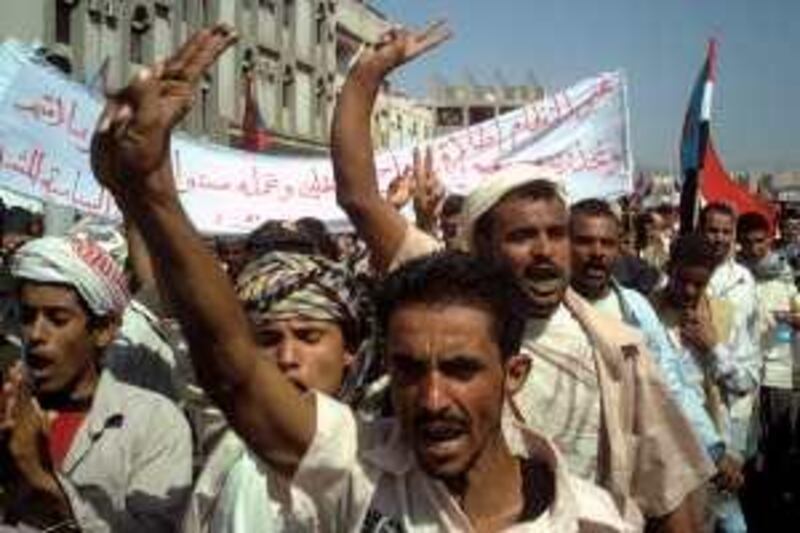SANA'A // The Yemeni government and the southern secessionist movement are accusing each other of killing three people from the north of the country in the south this week. On Sunday gunmen shot dead a northerner security officer, Fawaz al Kamali, on the motorway between Aden and Shabwa provinces while he was on the way to his home village to spend Eid with his family.
Armed men ambushed another northern man at a roadblock near Radfan district, Lahj province, about 360 kilometres south of the capital, Sana'a, killing him and seizing his car, according to Saba, the state news agency. A third northerner, who was returning to Sana'a from the main southern port city of Aden, was stopped by the armed men and shot dead in front of his family. Government authorities blamed the killings on activists from the southern separatist movement.
However, Nasser al Khubaji, a prominent leader in the movement condemned the killings, and accused the government of trying to tarnish the group's image. The recent killings came as tension has mounted in the south, where secessionist anti-government protests have continued and dozens have been reportedly killed and injured in clashes between southern protesters and police this year. Three protesters were killed and six others - including four policemen - injured last week in clashes between southern protesters and police in the southern province of Shabwah.
"We do strongly denounce such killings of innocent people. We are against such acts. Our problem is not with our brothers in the north but with the regime only," Mr al Khubaji said. The interior ministry announced a list of 16 wanted southern separatists including the suspected killers of the three northerners. The ministry said in a statement on Tuesday the wanted people orchestrated the riots and other killings in Lahj province recently, without providing further details.
In order to confront the southern movement, which has been gaining momentum, the government last June backed establishing vigilante militias in the south described as "unity guards". The authorities announced then that the committees had been set up to protect and defend the country's unity. Mr al Khubaji accused the unity guards of carrying out the killings of the northerners in order to discredit his movement.
"It is ... the committees for the defence of unity that stand behind such killings in a desperate attempt to show the southern movement is carrying out hate crimes. By accusing us, the regime is pushing towards a cycle of lasting violence," Mr al Khubaji said. Ali Saif Hasan, chairman of the Political Development Forum, a Sana'a-based think tank, said the killing of the three northerners would generate serious consequences and problems for ordinary people.
"These killings are foolish and reckless acts that do not have, in my opinion, any political grounds or were carried out by any political organisation. However, they will remain a serious and weak point that tarnishes the reputation of the southern movement in Yemen," Mr Hasan said. In 1990, a union between the Marxist-led south and tribal-dominated north was reached. However, the deal between the People's General Congress of the north and the Yemeni Socialist Party of the south fell apart and a political crisis developed, which led to civil war in 1994.
Southerners complain any partnership following unification in 1990 was destroyed by the 1994 civil war. For the past three years, the southern part of Yemen has been riled by protests over economic and political marginalisation. The government is also facing an armed insurgency in the north where fierce fighting between the army and al Houthi insurgents in the northern province of Sa'ada and the Harf Sufian district of neighbouring Arman province continue.
The government launched a massive offensive on August 11 against the rebels who belong to the Zaidi sect, an offshoot of Shia Islam. The rebels have been fighting a sporadic war against Yemen's government since 2004 and have repeatedly accused the Saudi army of backing Yemeni troops. Saudi Arabia joined the battle last month after the Houthis attacked Jebel al-Dukhan inside the Saudi border. malqadhi@thenational.ae





